- Clone
- M3/84 (See other available formats)
- Regulatory Status
- RUO
- Other Names
- CD107b, LAMP-2
- Isotype
- Rat IgG1, κ
- Ave. Rating
- Submit a Review
- Product Citations
- publications
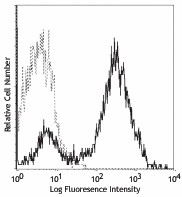
-

Thioglycolate-elicited peritoneal macrophages stained with M3/84 PE
| Cat # | Size | Price | Save |
|---|---|---|---|
| 108501 | 50 µg | ¥14,780 | |
| 108502 | 500 µg | ¥46,640 |
Mac-3 is a 110 kD type I membrane glycoprotein, also known as CD107b and LAMP-2. It is expressed on lysosomal membranes and the plasma membrane of macrophages and some myeloid cell lines. In the bone marrow, few cells display Mac-3 antigen on the surface, but a large proportion express Mac-3 in the cytoplasm. CD107b has been identified as a ligand for galaptin, an S-type lectin present in the extracellular matrix. Mac-3/CD107b is upregulated in some tumors and increased expression has been correlated with enhanced metastatic potential.
Product DetailsProduct Details
- Verified Reactivity
- Mouse
- Antibody Type
- Monoclonal
- Host Species
- Rat
- Immunogen
- Membrane glycoproteins from C57BL/6 mouse peritoneal exudate cells
- Formulation
- Phosphate-buffered solution, pH 7.2, containing 0.09% sodium azide.
- Preparation
- The antibody was purified by affinity chromatography.
- Concentration
- 0.5 mg/ml
- Storage & Handling
- The antibody solution should be stored undiluted between 2°C and 8°C.
- Application
-
FC - Quality tested
IP, ICC, IHC-P, IHC-F - Reported in the literature, not verified in house - Recommended Usage
-
Each lot of this antibody is quality control tested by immunofluorescent staining with flow cytometric analysis. For flow cytometric staining, the suggested use of this reagent is ≤ 1.0 µg per million cells in 100 µl volume. It is recommended that the reagent be titrated for optimal performance for each application.
- Application Notes
-
Additional reported applications (for the relevant formats) include: immunoprecipitation1-4 and immunohistochemical staining of acetone-fixed frozen sections5,6 and paraformaldehyde-fixed paraffin-embedded sections9-11.
-
Application References
(PubMed link indicates BioLegend citation) -
- Springer TA. 1981. J. Biol. Chem. 256:3833. (IP)
- Ho MK, et al. 1983. J. Biol. Chem. 258:636. (IP)
- Chen JW, et al. 1985. J. Cell Biol. 101:85. (IP)
- Ralph P, et al. 1983. J. Immunol. 130:108. (IP)
- Flotte TJ, et al. 1983. Am. J. Pathol. 111:112. (IHC)
- Kano M, et al. 1998. Transplantation 65:837. (IHC)
- Terrazas LI,et al.2005. Int J Parasitol. 35:1349. PubMed
- Hayashida A, et al. 2011. J. Biol Chem. 286:3288. PubMed
- Vollmar P, et al. 2010. J. Immunol. 185:6338. (IHC)
- Odorisio T, et al. 2002. J. Cell Sci. 115:2559. (IHC)
- Nessler S, et al. 2007. Brain 130:2186. (IHC)
- Product Citations
-
- RRID
-
AB_313382 (BioLegend Cat. No. 108501)
AB_313382 (BioLegend Cat. No. 108502)
Antigen Details
- Structure
- 110 kD
- Distribution
-
Macrophages, some myeloid cell lines
- Function
- Differentiation and activation
- Cell Type
- Macrophages
- Biology Area
- Immunology, Innate Immunity
- Molecular Family
- CD Molecules
- Antigen References
-
1. Springer TA. 1981. J. Biol. Chem. 256:3833.
2. Ho MK, et al. 1983. J. Biol. Chem. 258:636.
3. Ralph P, et al. 1983. J. Immunol. 130:108. - Gene ID
- 16784 View all products for this Gene ID
- UniProt
- View information about CD107b on UniProt.org
Related Pages & Pathways
Pages
Related FAQs
Other Formats
View All CD107b Reagents Request Custom Conjugation| Description | Clone | Applications |
|---|---|---|
| FITC anti-mouse CD107b (Mac-3) | M3/84 | FC |
| PE anti-mouse CD107b (Mac-3) | M3/84 | FC |
| Purified anti-mouse CD107b (Mac-3) | M3/84 | FC,IP,ICC,IHC-P,IHC-F |
| Biotin anti-mouse CD107b (Mac-3) | M3/84 | FC |
| Alexa Fluor® 488 anti-mouse CD107b (Mac-3) | M3/84 | FC |
| Alexa Fluor® 647 anti-mouse CD107b (Mac-3) | M3/84 | FC,ICC |
Customers Also Purchased
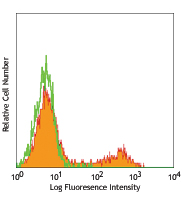
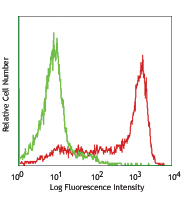
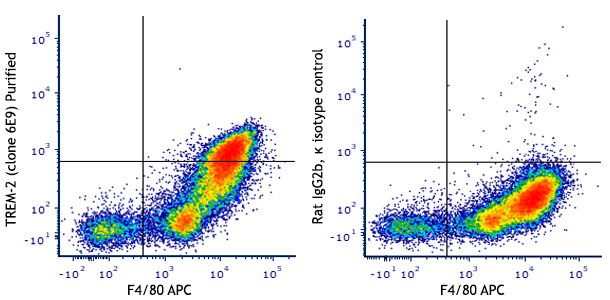
Compare Data Across All Formats
This data display is provided for general comparisons between formats.
Your actual data may vary due to variations in samples, target cells, instruments and their settings, staining conditions, and other factors.
If you need assistance with selecting the best format contact our expert technical support team.
-
FITC anti-mouse CD107b (Mac-3)
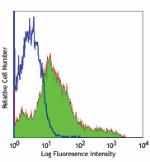
Thioglycollate-elicited BALB/c mouse peritoneal macrophages ... -
PE anti-mouse CD107b (Mac-3)
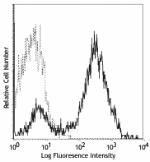
Thioglycolate-elicited peritoneal macrophages stained with M... -
Purified anti-mouse CD107b (Mac-3)

Thioglycolate-elicited peritoneal macrophages stained with M... -
Biotin anti-mouse CD107b (Mac-3)
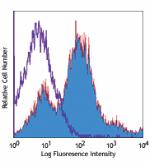
Thioglycollate-elicited BALB/c mouse peritoneal macrophages ... -
Alexa Fluor® 488 anti-mouse CD107b (Mac-3)
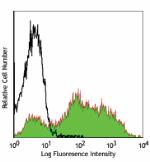
Thioglycolate-elicited BALB/c mouse peritoneal macrophages s... -
Alexa Fluor® 647 anti-mouse CD107b (Mac-3)
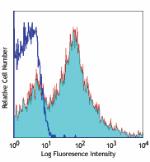
Thioglycollate-elicited BALB/c mouse peritoneal macrophages ... 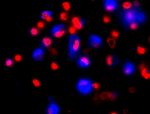
Thioglycolate-elicited C57BL/6 mouse peritoneal cells were f...









Follow Us